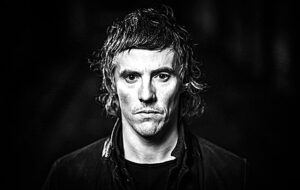
Colm Warren told David Hennessy about his song Dead Days which has struck a chord addressing both the struggles of the working man and the rise of AI.
Derry’s Colm Warren recently returned with Dead Days that shows why he is making himself a leading voice in rock in Northern Ireland.
Fiachna Ó Braonáin of Hothouse Flowers & RTE Radio 1 says he has: “An extraordinary voice.”.
Hot Press said: “We expect great things.”
CLASH added: “A truly moving listen.”
Following the success of his previous release, Alright, Dead Days sees him delve into darker themes painting a vivid picture of an overdeveloped world overrun by soulless innovation and passionless creation—a stark commentary on societal inequalities and the widening economic gap.
Colm describes the track as a cautionary tale from the viewpoint of a “working man” in need of hope in an era where technology threatens jobs and distorts truth.
Dead Days serves as a poignant reminder of the challenges faced by many in today’s society.
Now known for his powerful vocals, immense orchestral arrangements and compelling songwriting ability, Warren actually first made a name for himself with the punk band The Twenty.
But he walked away from the band and music altogether before being drawn back to it in recent years having struggled without the creative outlet.
Dead Days comes with a suitable video that is reminiscent of Black Mirror shows the true horror of the world he is imagining in the track.
Colm Warren told The Irish World: “The song’s kind of harking back to when I used to play in punk bands back in the day on the Belfast scene.
“I kind of had a version of Dead Days sitting about and I kind of updated it thinking about AI and just the way things have been in the world in the last kind of few years.
“I tried to make a bit of a comment on what looks like a pretty difficult period for working people, my view from a little bit of personal experience.
“I’ve been on the dole and I’ve sat beside lads who have been in that situation.
“I was a younger man and still with maybe opportunities in front of me but there were lads there 40, 50 years at it and I was kind of trying to put myself in their place.
“It gets even harder with AI and technology coming down the track.
“We’ve got to think about what we’re doing to give people opportunities to have a bit of hope and aspiration, especially coming from that particular working class background that obviously I’m from myself.
“I spoke to a great fella Tetsuhiko Endo.
“He’s a Japanese guy/ American, guy living in Dublin and he makes videos so I kind of had an idea.
“I kind of sold him a bit of an idea of what I was trying to do with the Dead Days thing.
“I think we probably would have needed Universal Studios or HBO to make my version.
“But in fairness to Tet, he’s a genius and given the constraints independent artists have to work with, we think we managed to pull together a production.
“It’s almost like a wee short film in terms of trying to point out what we might be poking at in respect of the song and it’s rationale, the reason for it.”
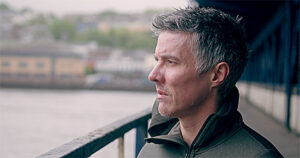
There is a touch of Black Mirror to the video, isn’t there? Although the situations in it seem like science fiction, nothing is too hard to imagine…
“To go full dystopia, you probably need a lot of CGI and a big budget.
“But what we tried to do was made it a wee bit more humorous, we obviously had dancers dressed up as robots and they did a brilliant job.
“It’s almost a dark take with a bit of a humorous sort of vibe to it in respect of just trying to draw attention to the big things people don’t really think about but you see it in society at the minute.
“There’s a lot of discontent and it’s only going to get worse if we don’t have good opportunities for people.
“On top of that was the AI impact on art, where that’s going: A mass production, corporate kind of takeover of fricking art.
“Are people singing and are people writing music? Is it just a computer formulating trash basically that they know will sell?
“How do you know what’s real and what’s not? All that sort of stuff.
“So these are the kind of things that occupy my mind and I worry about more than I need to.
“It’s just our wee comment on things and wherever it goes after that, that’s fine.
“We’re just happy to get that out.”
I thought the video was spot on where it shows a robot pouring a pint of Guinness and doing a terrible job. I don’t know if you have ever wanted to complain about something and been stuck talking to a robot. You need a human touch for some things…
“That’s it, you’ve nailed it there. That’s what we’re doing.
“People are brilliant, people are important. Trying to replace them is not easy so as much as it’s a bit of a dark take the bit at the end where there’s a band playing and that’s about how you can’t really beat human generated art, creativity. The kind of stuff you can’t programme into a machine because that’s hard to put your finger on and that’s what makes us human really.
“Sometimes we forget that.
“A lot of people want to run people down and say how annoying people are.
“I just disagree with that fundamentally.
“Yeah, you can bring technology and we have over the centuries deployed technology in a number of ways to make life easier but let’s not ever think we want it to replace what’s special about human beings.”
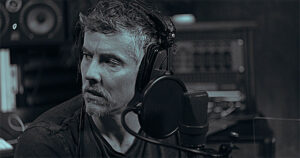
You saw people put on the scrap heap after 40, 50 years at a job..
“Yeah, I have my own experience of being made redundant at a job working with fellas either in factories who have been in them for years and then when industry changes, or technology comes along, that makes manual labour less required.
“They lose their jobs.
“And I’m obviously talking to you from Northern Ireland. The manufacturing sector used to be the pride of Ireland.
“The northeast of Ireland was actually the most productive part of Ireland 100 years ago, it’s been decimated largely so what happens all the people that lose those jobs?
“It’s not like they’re walking into other jobs very easily.
“Sometimes, I think it’s a bit of abandonment there and then when you’re in that position, when you’ve got nothing to aim at and it’s difficult to find aspiration and new opportunities, it’s a dangerous spiral and people lose confidence.
“They forget how good they actually are.

“If we walk too far down this AI road and we just think technology’s gonna replace people all over the place, what are you gonna do with those people?
“People still need opportunities but I’m not sure we’re looking after people as well as we could be as a society generally.
“I think you’re seeing that.
“People talk about the cost of living crisis, the way COVID was handled.
“It’s alright for people at the top often but not so much for the working man or the working woman.
“That’s what Dead Days is trying to, in my own way, touch upon.
“Without hope, without opportunity, it’s a dangerous place for a human being to be.
“When I’m writing songs they generally, maybe not obviously,
will be based on personal experience but through the music, you’re trying to get emotions out.
“So that’s really why I do it.”
You have written about mental health matters before. You just feel it’s important that people talk about these things and deal with these things…
“Yeah, that’s right.
“I was out of music, didn’t do anything in music for a long time after I stopped playing in bands.
“There’s all sorts of reasons for that but I found it quite difficult then without a creative outlet.
“Eventually it kind of overtakes you a little bit, you need somewhere to go with that emotion so I came back and the first few tracks that I dripped out very tentatively were probably kind of focused on loss, hopelessness, that type of thing.
“And I think, surprisingly enough, quite a lot of people that I knew well, who I wouldn’t have expected to be saying it to me, got in touch to say, ‘Look, I really appreciated some of the stuff that you were writing and saying and trying to get at in the songs’.
“That was very surprising to me but maybe that shows you.
“I think people do struggle with a lot of stuff.
“I kind of try to just write honestly about emotions that I feel or experience and sometimes it’s just a way of letting people sometimes the closest people to you understand that sometimes the masks that we wear really on the outside’s not everything that’s going on.
“I think that’s probably a lot more common than anybody wants to admit or realise.”
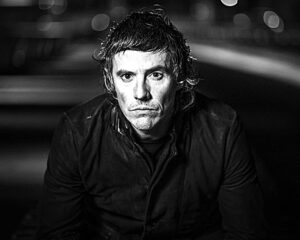
You were in the punk band The Twenty but prior to that you were reticent about getting too involved in music..
“I wrote a lot of songs as a teenager and a young kid and even as a younger man but I didn’t tell anybody that I wrote songs for years.
“I didn’t really think it was a thing that I could do or maybe just the way that I was brought up, it wasn’t something you admitted to because you might have got stick, so I buried a lot of that for years and then eventually came out.
“We started a band in Belfast probably back in my mid 20s and we were playing on the underground scene there and it didn’t necessarily start with a view to forming a punk band, the nature of the songs I was writing and the way the delivery came out ended up being quite punky.
“Then that went on for a while.
“It got to the stage where the band was probably having to go the next level but at the same time you have got family and commitments and jobs and you’re trying to fund the logistics of that.
“It just got too much and the band kind of petered out.
“Then for a number of years I didn’t even look at a guitar because I found it very, very difficult to think about music or writing a song or even playing a song because I had no outlet.
“I buried it.
“I just buried it, I didn’t touch it.
“I suppose it overcame me in the end.
“It was just an itch that needed to be scratched.
“Eventually I kind of found a way back to kind of pick up the guitar, strum a few chords and then start to play a few songs for people again.
“That’s how I kind of got back into it.
“I suppose when I come at it I’m not trying to sound like anything.
“I’m not trying to copy anybody.
“I’m not listening to what’s in the charts.
“I don’t give a sh*t about the commercial side, it’s not the driver at all.
“I’m trying to put music to the songs that I think best reflect the emotions I’m trying to explore through them and that’s how the songs kind of started.
“The old fire still burns when you’ve got frustrations and that punky background, I suppose.”
The new music is very different to your punk days..
“Yeah, I think it’s surprised a lot of people even the way I sing because the ones that would have seen me in the band being around that scene back in the day, that was just all very aggressive.
“Whereas then when we try to demonstrate there’s a bit more going on with some of these other songs.
“Yeah, people seem to have enjoyed that and I’ve enjoyed it as well.
“It’s a lot easier than having to scream your balls off over a really loud band and all that kind of stuff.
“The main reason and driver for me is I just need to get these things out of me and that’s it, so what comes after is kind of a bonus.”
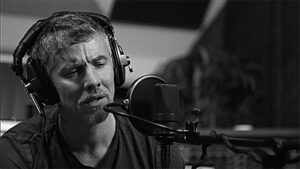
I imagine Derry has a new lease of life with Derry Girls etc.
What has it been like to see that?
“Derry has got a great reputation historically on the island for brilliant music and art coming out of the place, and it always has.
“Obviously, the high profile examples and going right back to the Undertones and Phil Coulter or whatever, you’ve got all that musical history in there.
“There’s loads of great bands: Bands people have heard of and bands people have never heard of, it’s amazing in terms of the scene and the talent in the town.
“It’s class.
“I kind of always look at it and think there’s no reason why it couldn’t be the Galway of the north.
“The arts scene has always been thriving here.
“A difficult history drives a bit of that.
“It drives people to want to comment on some of the injustices that they’ve seen and whatever.”
Speaking of that difficult history, how do you see the landscape now in Northern Ireland after Brexit and all, is there no return to the dark days or the tensions still there under the surface?
“Obviously, there’s always going to be the extremes.
“It’s hard to drag them out of the dark days of the past but generally speaking, I think Derry’s no different from the rest of the North.
“I think largely people are looking to move on.
“We’ve had a good period of more stability, peace, whatever and I think it’s very difficult to see how it would drift back into the dark days.
“You get the odd mad rocket running around the place because they’re everywhere but there’s no widespread support for that sort of stuff anymore.
“People are looking at what is the future of the country of Ireland from a more positive perspective and seeing the benefits peace and stability can bring: Investment, jobs.
“If we can harness more of that, it would be good.
“I think there’s a positive vibe around the place and hopefully the future’s bright for Derry.”
Dead Days is out now.
For more information, click here.



